Qualitative Research Proposal: Cancer Associated Malnutrition and Cachexia
Added on 2022-12-26
23 Pages5858 Words1 Views
Running head: QUALITATIVE RESEARCH PROPOSAL
QUALITATIVE RESEARCH PROPOSAL: CANCER ASSOCIATED
MALNUTRITION AND CACHEXIA: AN EVALUATION OF NUTRITIONAL
INTERVENTIONS FOR MANAGEMENT OF MUSCLE WASTING ACROSS CANCER
PATIENTS
Name of the Student:
Name of the University:
Author note:
QUALITATIVE RESEARCH PROPOSAL: CANCER ASSOCIATED
MALNUTRITION AND CACHEXIA: AN EVALUATION OF NUTRITIONAL
INTERVENTIONS FOR MANAGEMENT OF MUSCLE WASTING ACROSS CANCER
PATIENTS
Name of the Student:
Name of the University:
Author note:
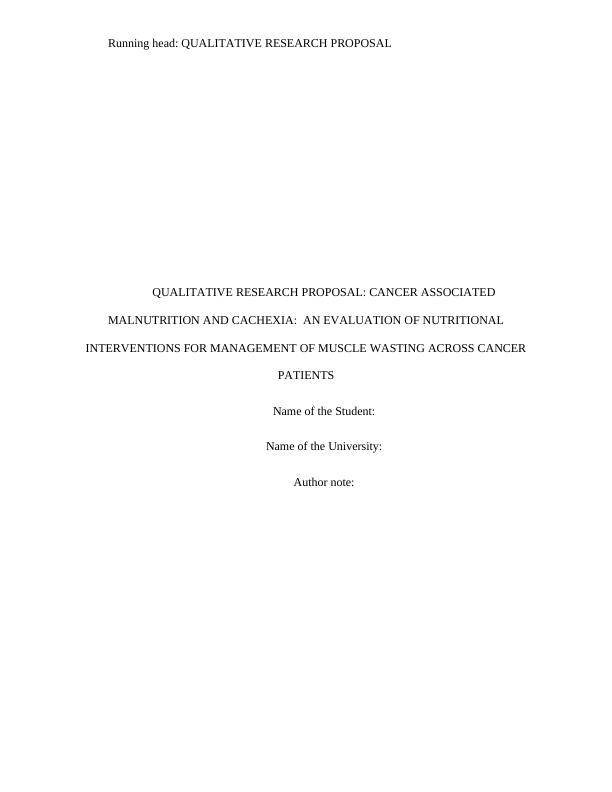
1QUALITATIVE RESEARCH PROPOSAL
Table of Contents
1. Summary..........................................................................................................................2
2. Background and Introduction..........................................................................................3
2.1. Theoretical Framework.............................................................................................7
3. Research Questions..........................................................................................................8
4. Suppositions.....................................................................................................................9
5. Aims and Objectives......................................................................................................10
5.1. Overall Aim............................................................................................................10
5.2. Specific Objectives.................................................................................................10
6. Research Design............................................................................................................11
6.1. Qualitative Research Approach..............................................................................11
6.2. Methodological Framework....................................................................................12
7. Research Process...........................................................................................................13
7.1. Research Participants..............................................................................................13
7.1.1. Recruitment Process........................................................................................14
7.1.2. Sampling Method and Sample Size Distribution.............................................14
7.2. Data Collection Methods........................................................................................14
7.2.1. Systematic Review...........................................................................................14
7.2.2. Data Extraction................................................................................................15
7.3. Data Analysis..........................................................................................................15
Table of Contents
1. Summary..........................................................................................................................2
2. Background and Introduction..........................................................................................3
2.1. Theoretical Framework.............................................................................................7
3. Research Questions..........................................................................................................8
4. Suppositions.....................................................................................................................9
5. Aims and Objectives......................................................................................................10
5.1. Overall Aim............................................................................................................10
5.2. Specific Objectives.................................................................................................10
6. Research Design............................................................................................................11
6.1. Qualitative Research Approach..............................................................................11
6.2. Methodological Framework....................................................................................12
7. Research Process...........................................................................................................13
7.1. Research Participants..............................................................................................13
7.1.1. Recruitment Process........................................................................................14
7.1.2. Sampling Method and Sample Size Distribution.............................................14
7.2. Data Collection Methods........................................................................................14
7.2.1. Systematic Review...........................................................................................14
7.2.2. Data Extraction................................................................................................15
7.3. Data Analysis..........................................................................................................15
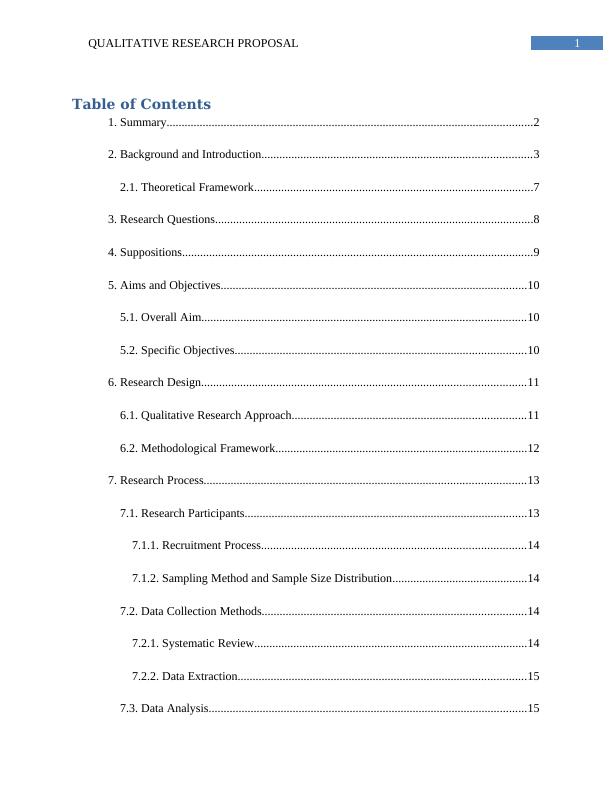
2QUALITATIVE RESEARCH PROPOSAL
7.4. Research Validity....................................................................................................15
8. Anticipated Ethical Issues..............................................................................................15
9. Proposed Study Limitations...........................................................................................16
10. Timeline.......................................................................................................................16
References..........................................................................................................................18
7.4. Research Validity....................................................................................................15
8. Anticipated Ethical Issues..............................................................................................15
9. Proposed Study Limitations...........................................................................................16
10. Timeline.......................................................................................................................16
References..........................................................................................................................18
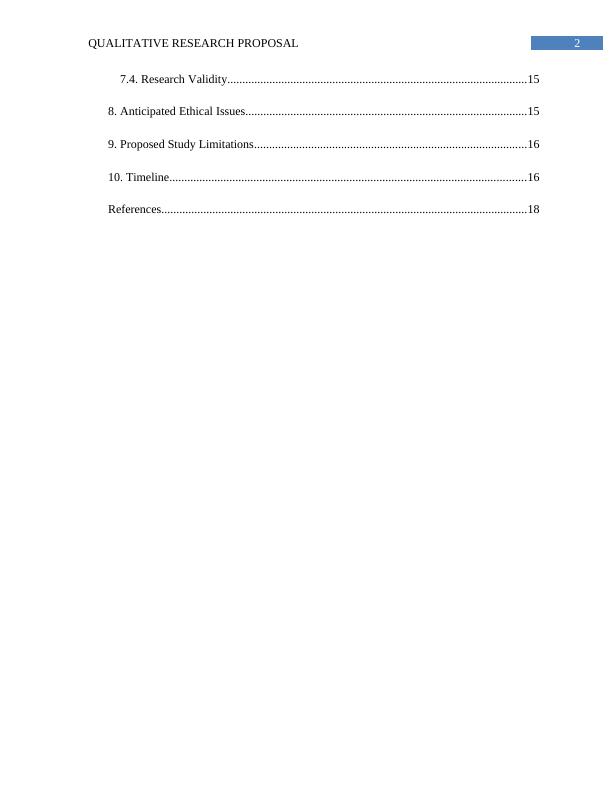
3QUALITATIVE RESEARCH PROPOSAL
1. Summary
The following qualitative research proposal will focus upon conducting a systematic
review to examine the effectiveness of various nutritional interventions which can be
implemented for the purpose of mitigating the debilitating symptoms of malnutrition and
cachexia post treatment of cancer. The following proposal will focus upon defining the
components of a narrative theory as the methodological framework chosen for the conducting the
proposed systematic review. It will be ensured that the studies which will be selected for the
systematic review will recruit adult patients (within the age group of 18 to 65 years) suffering
from cancer who have undergone treatment for at least a year or more and hence, will comprise
as the participants for the proposed systematic review. Qualitative data will be collected using
systematic review, followed by analyzing the same using narrative synthesis methods. Studies
which have been preferably conducted in developed countries, across healthcare or hospital
settings providing cancer treatment will be selected for the proposed systematic review. A
structured data extraction table will be utilized to guide the research during the collection of data
and identification of key components to be included from the study in the systematic review.
Further, thematic analysis – a key component of narrative synthesis will be used to analyze the
data collected from the studied chosen in the systematic review, which will comprise of
categorizing the information obtained into key themes - with each theme representing a
particular nutritional intervention. Considering that systematic reviews are often subject to
publication bias or poor research quality, the validity and rigor of the studies so selected will be
ensured using credible critical appraisal tools such as those developed by the Joanna Brigg’s
Institute (JBI). Considering the same, it will be ensured that studies which are of low or moderate
quality will be incorporated in the systematic review.
1. Summary
The following qualitative research proposal will focus upon conducting a systematic
review to examine the effectiveness of various nutritional interventions which can be
implemented for the purpose of mitigating the debilitating symptoms of malnutrition and
cachexia post treatment of cancer. The following proposal will focus upon defining the
components of a narrative theory as the methodological framework chosen for the conducting the
proposed systematic review. It will be ensured that the studies which will be selected for the
systematic review will recruit adult patients (within the age group of 18 to 65 years) suffering
from cancer who have undergone treatment for at least a year or more and hence, will comprise
as the participants for the proposed systematic review. Qualitative data will be collected using
systematic review, followed by analyzing the same using narrative synthesis methods. Studies
which have been preferably conducted in developed countries, across healthcare or hospital
settings providing cancer treatment will be selected for the proposed systematic review. A
structured data extraction table will be utilized to guide the research during the collection of data
and identification of key components to be included from the study in the systematic review.
Further, thematic analysis – a key component of narrative synthesis will be used to analyze the
data collected from the studied chosen in the systematic review, which will comprise of
categorizing the information obtained into key themes - with each theme representing a
particular nutritional intervention. Considering that systematic reviews are often subject to
publication bias or poor research quality, the validity and rigor of the studies so selected will be
ensured using credible critical appraisal tools such as those developed by the Joanna Brigg’s
Institute (JBI). Considering the same, it will be ensured that studies which are of low or moderate
quality will be incorporated in the systematic review.
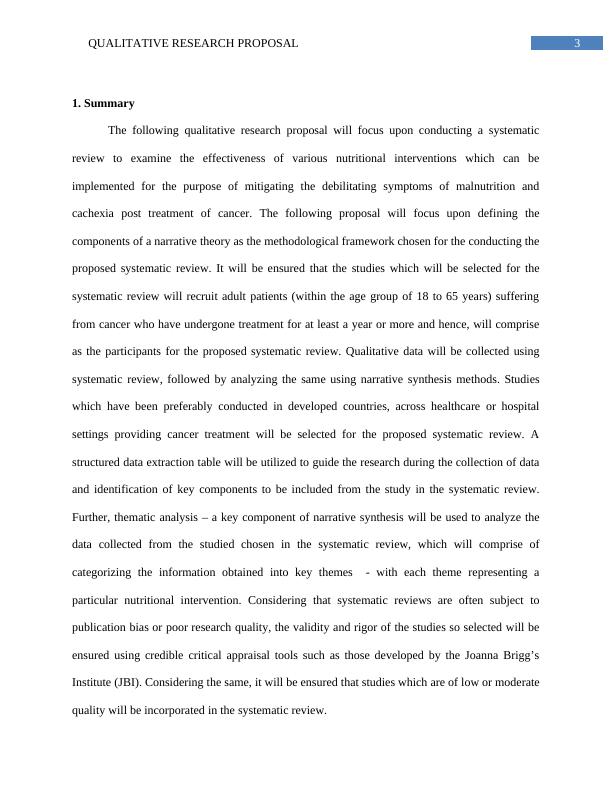
4QUALITATIVE RESEARCH PROPOSAL
2. Background and Introduction
Cancer is a chronic illness with debilitating metabolic, physiological and psychological
health consequences and is caused when the normal cellular growth and developmental processes
undergo abnormal mutations resulting in abnormally excessive growth of tissues and tumors
which are malignant (Gellrich et al., 2015). Due to the associated tissue and endothelial changes
occurring as a resultant of this malignancy, cancer resulted in excessively aggravated metabolic
consequences leading to catabolic states and loss of essential muscle. One of the most commonly
occurring metabolic symptom across patients inflicted with cancer includes malnutrition and
cancer cachexia. Malnutrition has been estimated to exist in cancer patients at prevalence rates of
30 to 80% (Marshall et al., 2019). Cachexia in cancer implies a multifactorial syndrome
characterized by the continuous degradation and reduction of lean body mass due to catabolic
states prevalent in cancer, a condition associated with a negative balance of calories and proteins.
Such a catabolic state, responsible for the occurrence of cachexia and poor nutritional status in
cancer is caused due to the interplay of a number of factors, mainly due to increased rates of
oxidative stress and inflammation and abnormal metabolic processes exerted by the malignant
tumor, coupled with the decreased desire in the patient to ingest food as a result of cancer related
fatigue (Ryan et al., 2016).
If left untreated, poor nutritional status and cachexia results in extreme levels of fatigue,
impairment in normal physiological functions of the body, loss of immunological capacity and
the resultant reductions in the tolerance of the patient to infectious diseases or administration of
additional robust treatments, loss of quality of life and increase mortality across patients inflicted
with cancer (Porporato, 2016). Hence the need to review possible interventions targeted at the
mitigation of cancer related cachexia is of utmost importance considering the above mentioned
2. Background and Introduction
Cancer is a chronic illness with debilitating metabolic, physiological and psychological
health consequences and is caused when the normal cellular growth and developmental processes
undergo abnormal mutations resulting in abnormally excessive growth of tissues and tumors
which are malignant (Gellrich et al., 2015). Due to the associated tissue and endothelial changes
occurring as a resultant of this malignancy, cancer resulted in excessively aggravated metabolic
consequences leading to catabolic states and loss of essential muscle. One of the most commonly
occurring metabolic symptom across patients inflicted with cancer includes malnutrition and
cancer cachexia. Malnutrition has been estimated to exist in cancer patients at prevalence rates of
30 to 80% (Marshall et al., 2019). Cachexia in cancer implies a multifactorial syndrome
characterized by the continuous degradation and reduction of lean body mass due to catabolic
states prevalent in cancer, a condition associated with a negative balance of calories and proteins.
Such a catabolic state, responsible for the occurrence of cachexia and poor nutritional status in
cancer is caused due to the interplay of a number of factors, mainly due to increased rates of
oxidative stress and inflammation and abnormal metabolic processes exerted by the malignant
tumor, coupled with the decreased desire in the patient to ingest food as a result of cancer related
fatigue (Ryan et al., 2016).
If left untreated, poor nutritional status and cachexia results in extreme levels of fatigue,
impairment in normal physiological functions of the body, loss of immunological capacity and
the resultant reductions in the tolerance of the patient to infectious diseases or administration of
additional robust treatments, loss of quality of life and increase mortality across patients inflicted
with cancer (Porporato, 2016). Hence the need to review possible interventions targeted at the
mitigation of cancer related cachexia is of utmost importance considering the above mentioned
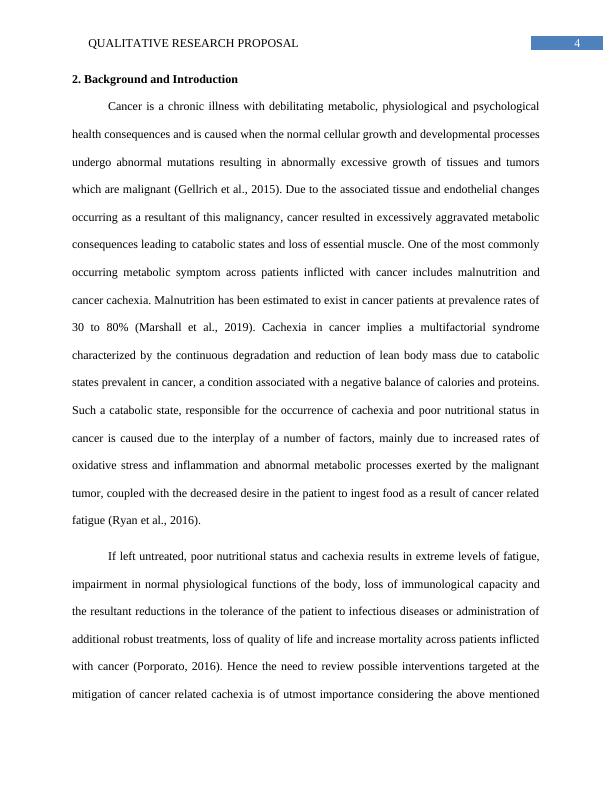
5QUALITATIVE RESEARCH PROPOSAL
detrimental health consequences affecting the overall life quality and life expectancy of cancer
patients – hence comprising one of the major rationales for performing the proposed qualitative
research. In addition to the loss in quality of life which is required to be addressed immediately
across cancer patients, the prevalence of malnutrition and cachexia is associated with a need to
administer comprehensive treatments, increased expenditures and medical costs incurred by the
healthcare organization as well as for the family of the concerned patient, coupled with increased
duration of stay for the cancer inflicted patients (Aoyagi et al., 2015). Hence, the administration
of timely interventions of nutrition for the mitigation of malnutrition and cachexia to further
prevent the incurrence of high expenditures of medical costs associated at both the organizational
and patient or family level form the underlying rationale for the proposed qualitative research
and systematic review.
It has been estimated that malnutrition and the resultant cachexia in cancer patients is a
multifactorial condition due to the combination of a number of factors such as poor nutritional
intake resulting in under-nutrition, high rates of inflammation and oxidative stress due to cancer
and the resultant catabolic state (Petruzzelli & Wagner, 2016). One of the key issues pertaining
to emergence of cachexia in cancer patients is due to poor nutritional intake. The disruption in
nutritional and food intake prevalent across cancer patients is caused due to food intake
symptoms of loss in appetite, reduced ingestion, difficulties in swallowing and alteration or loss
in the perception of taste or smell (Sandri, 2016). Further, the psychological upheavals caused
due to cancer, along with fatigue and symptoms of chronic pain are also key contributors of
reduced food intake and the resultant inadequate nutritional status, malnutrition and muscle
wastage or cachexia across cancer patients. It has been estimated that vulnerable patients
suffering from cancer, pose the highest risk of acquisition of malnutrition and hence, associated
detrimental health consequences affecting the overall life quality and life expectancy of cancer
patients – hence comprising one of the major rationales for performing the proposed qualitative
research. In addition to the loss in quality of life which is required to be addressed immediately
across cancer patients, the prevalence of malnutrition and cachexia is associated with a need to
administer comprehensive treatments, increased expenditures and medical costs incurred by the
healthcare organization as well as for the family of the concerned patient, coupled with increased
duration of stay for the cancer inflicted patients (Aoyagi et al., 2015). Hence, the administration
of timely interventions of nutrition for the mitigation of malnutrition and cachexia to further
prevent the incurrence of high expenditures of medical costs associated at both the organizational
and patient or family level form the underlying rationale for the proposed qualitative research
and systematic review.
It has been estimated that malnutrition and the resultant cachexia in cancer patients is a
multifactorial condition due to the combination of a number of factors such as poor nutritional
intake resulting in under-nutrition, high rates of inflammation and oxidative stress due to cancer
and the resultant catabolic state (Petruzzelli & Wagner, 2016). One of the key issues pertaining
to emergence of cachexia in cancer patients is due to poor nutritional intake. The disruption in
nutritional and food intake prevalent across cancer patients is caused due to food intake
symptoms of loss in appetite, reduced ingestion, difficulties in swallowing and alteration or loss
in the perception of taste or smell (Sandri, 2016). Further, the psychological upheavals caused
due to cancer, along with fatigue and symptoms of chronic pain are also key contributors of
reduced food intake and the resultant inadequate nutritional status, malnutrition and muscle
wastage or cachexia across cancer patients. It has been estimated that vulnerable patients
suffering from cancer, pose the highest risk of acquisition of malnutrition and hence, associated
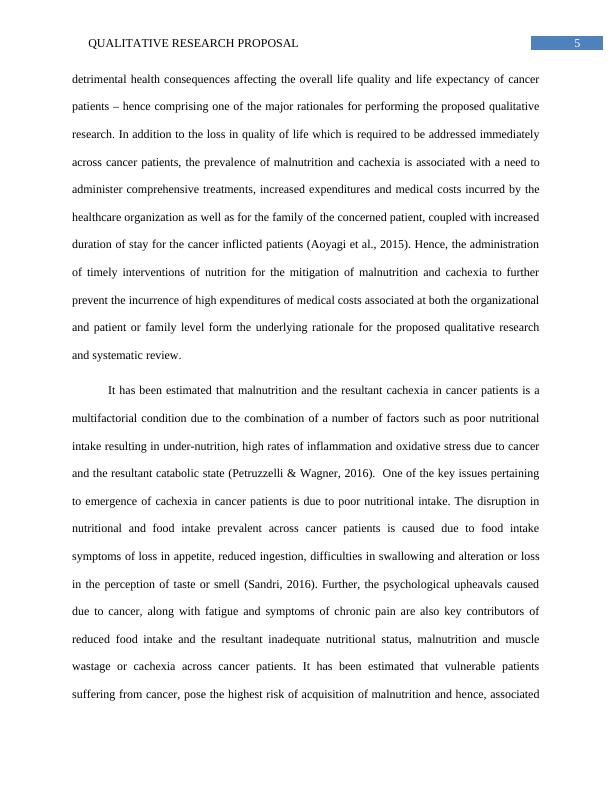
End of preview
Want to access all the pages? Upload your documents or become a member.
Related Documents
Effectiveness of interventions targeting physical activity, nutrition and healthy weight for university and college students: a systematic review and meta-analysislg...
|10
|9819
|1
Effectiveness of Photodynamic Therapy in Treating Non-Melanoma Skin Cancer: A Systematic Reviewlg...
|37
|8879
|480
Effectiveness of Interventions to Prevent MRSA Infection in Hospitalslg...
|17
|4823
|27
Literature Review on Mental Health in Nursinglg...
|8
|2003
|83
A Study of Road Accidents, Alcohol and Dander in Indialg...
|19
|6478
|226
Chemotherapy's Side Effects on Cancer Patientlg...
|33
|12845
|30